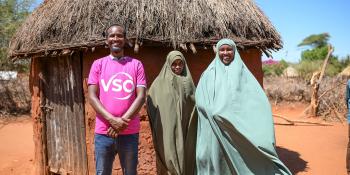VSO volunteer researcher Pauline Faughan spent three months visiting schools in the region, interviewing teachers, pupils and community members on their attitudes to girls getting educated. A social justice expert, Pauline was expecting to find boys’ education prioritised, but the extent of the negative attitudes to formal education she found shocked her.
The struggle for girls’ education
“It is better to be at school than at home. At home parents will prompt you to get married. At home – there is hardly anything good which will help with my future”
Pupil, Kacheri school
Being an adolescent girl isn't easy anywhere in the world. Now imagine coming of age in Karamoja, Northern Uganda.
Your hope of finishing school withered years ago. Instead, you are likely to marry before the age of 18, whether you wish to or not. In Moroto village, only one in ten girls is able to complete their education.
Childhoods cut short
They say if a girl goes to school she becomes a prostitute. If you go to school no one will pay the dowryPupil at Nakapelimoru Primary School
Common to many societies, families in this part of Northern Uganda receive a dowry payment when a daughter is married off.
But in Karamoja, the bride price a girl can fetch her family decreases the more education she has received.
With child marriage widespread, Pauline heard how valuable these bridal payments could be to families below the poverty line – and the threat this poses to girls:
“In Karamoja, the best preparation the community felt for a traditional marriage was for the girl to be at home, no education,” Pauline explained.
“If you’ve no support from home to go to school, and you are meeting additional challenges, you are seen as more valuable at home in terms of the physical work you can do, and in terms of your marriage prospects - you drop out,” Pauline adds.
Girls who trade traditional dress and domestic duties for a school uniform and textbooks are seen as lazy, immoral ‘prostitutes’ who invite assault, early pregnancy and HIV
Fighting the status quo
Can you remember the worst thing a teacher ever said to you while you were at school?
"Some are harsh, especially male teachers. They say - look at you; you are old enough to be married. Look at your breasts!"
Deputy Head teacher, Moroto
In Karamoja, the start of your period can mean the end of your childhood - and of your chance to go to school.
Pauline’s research showed that found that teachers were well aware of the negative views held by communities and of other barriers to girls’ education like lack of private hygiene facilities, poorly equipped classrooms and early marriage.
Three-quarters of teachers admitted that facilities in their schools are inadequate for girls. 70% of head teachers cited negative parental attitudes to education as a driver of school drop-out.
Fighting the status quo
Can you remember the worst thing a teacher ever said to you while you were at school?
"Some are harsh, especially male teachers. They say - look at you; you are old enough to be married. Look at your breasts!"
Deputy Head teacher, Moroto
In Karamoja, the start of your period can mean the end of your childhood - and of your chance to go to school.
Pauline’s research showed that found that teachers were well aware of the negative views held by communities and of other barriers to girls’ education like lack of private hygiene facilities, poorly equipped classrooms and early marriage.
Three-quarters of teachers admitted that facilities in their schools are inadequate for girls. 70% of head teachers cited negative parental attitudes to education as a driver of school drop-out.
Taking action
VSO already works with schools and district government in Karamoja to strengthen education. Girls with teachers trained through us report more supportive and inclusive treatment. Now this new research shows that more work is needed.
“There are cultural factors, attitudes that have built up over generations. Quite a bit of staying power is required. In [Karamoja] there are no role models from their own community,” Pauline says.
“We need to build up that type of resource so girls can look to others who have lived in the same situation as them, in the same environment, and still managed to receive an education and go on to do things. It’s a very difficult environment.”
Thankfully, evidence like Pauline’s is helping us make a case for a longer-term approach. We hope to be able to fund a five-year project to improve the dire chances girls have of finishing school and reaching their potential.
Raising awareness so work can continue
Pauline herself is hoping that this research will in itself raise awareness of how hard it is for these girls:
“It was mind-blowing really. Hopefully I am able to give a voice to those people on the ground, who usually aren’t heard.”
Read more

The two volunteers empowering girls and young women in Mozambique
Nelma and Carmirene and are two volunteers working on VSO's EAGLE project in Mozambique. For Nelma and Carmirene, education is not just about school, it is about meeting people where they are and using the right tools to challenging harmful norms. Here are their stories.

A ripple of change: how VSO volunteers are transforming communities
Every act of volunteering begins with a choice — a decision to act out of a desire to make a difference. Across the world, VSO volunteers are proving that one spark of action can ignite something much bigger.
Opening doors to safety, education, and a brighter future
For girls in Karamoja, the poorest region in Uganda, being forced into early motherhood is all too common. This Christmas, you can open the doors to Safety, Education, and a Brighter Future.
